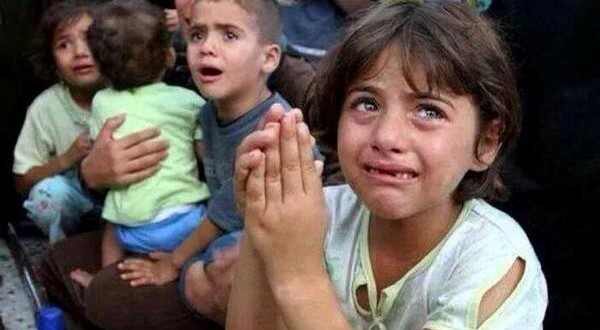Where was God when a little girl is raped and murdered? Where was God when millions were killed by Nazis and the communists? Where is God when unborn babies are killed by their own mothers by the millions, not just through brutal late-term abortions, but also through “reproductive health” products?
This dramatic question is asked again and again
over all the world. Being a theological question, the right answer can only
come from God himself.
A first reply comes from God’s reminder to Job,
a fabulously wealthy man who lost all his properties and his ten children:
“Where were you when I laid the foundation of the earth? Tell me, if you have
understanding. Who determined its measurements—surely you know!”
God’s dig has two implications. A creature’s
mind, made from nothing, is infinitely lower than the mind of the Creator. We
can’t wrap our mind around God’s. He wraps his around ours. Secondly, the world
has a design: an ordered arrangement that leads to a goal. His one goal is that “we may be holy in his
sight”. God created us for nothing else but to be with God. Taking Steven Covey’s famous “Begin
with the end in mind”, this clear end illuminates all the discussions about the
so-called problem of evil – which God integrated into his plan.
Where is God when evil is done? He is
everywhere, holding things into existence, and he is unchanging. We, who are
changeable, can make ourselves more or less present to God, depending on our
response to him. Thus, it is necessary to make a distinction between the
evildoer and the victim of the evil.
Plato clearly saw the difference: “He who
commits injustice is ever made more wretched than he who suffers it.” From
God’s point of view, the evildoer separates from him. The victim is drawn closer
to him.
And in both cases, the God’s death on the cross
illumines the issue.
For evildoers, they crucify Jesus anew, says
Hebrews 6:6. Where? The Catechism specifies: in their hearts. For he is in them. Philosophers define
evil as “deprivation of due good,” the removal of something wonderful that is
supposed to be there. Like blindness. Like houses shattered by a supertyphoon.
Evil per se is not a thing. For all things that God created is good. When a rapist
rapes, he on his own free will decides to remove beauty, truth and good from
himself. He crushes the image of God present in his soul. And so Plato is
right: a rapist is ever made more wretched than his victim.
But where is God in the victim? This is the key
problem, the hardest to crack. Why isn’t the omnipotent power of God used to shield the
victim? If God is love, why didn’t he stop all the pain? Again, the goal and
the cross illumine this mystery.
One of the ways God expresses the goal is when
he describes someone as “greatest in the kingdom”. Jesus used this phrase
twice. Whoever obeys and teaches these commandments will be called the greatest
in the kingdom of heaven. Whoever becomes humble like this little child is the
greatest in the kingdom of heaven.
The real world designed and revealed by God
turns our human conceptions upside down. Our contemporary minds can’t see the
world correctly because we think we are at the top looking down. But the truth
is the opposite. We are cosmic dust. Creatures can climb the infinite distance
to God only if we are humble enough to allow God to take us up to him, and to
act like him to benefit other people.
Because obedience and humility are key to
attaining the one goal, God has permitted the human beings’ decision to commit
evil against other humans and against God.
Suffering evil, in God’s master plan, facilitates the attainment of
these key attitudes.
C.S. Lewis who wrote the Problem of Pain says
that “God whispers in our pleasures but shouts in our pains. Pain is the
megaphone to rouse a dulled world.” Pain and suffering, because they make all
the other things of secondary importance, help us realize what is essential.
But there is more. Suffering identifies us with
God himself. The summit of God’s presence in the world is not a spectacular
display of power to achieve success and popularity. Thus in the mind of those anti-theists
who think themselves more efficient than God, God is a failure.
But failure is relative to the real goal.
God who became man attains the summit when he acts
according to the highest attribute of God: love. When he gives himself and obeys
God in the midst of insufferable humiliation: on the cross.
But this is not all. God’s love is displayed in
suffering. But when viewed with his logic, omnipotence and wisdom are also
displayed.
On the cross, the greatest possible evil, the
murder of God or deicide, is astutely turned to achieve the greatest good: the
salvation of all men.
Victims of cheating, rape, mutilation, and robbery have become, in the teaching of St. John
Paul the Great, recipients of a gift. They have become sharers in his work of
saving all men.
Victims have a choice. They can say yes to
participating in the greatest deed, becoming the greatest in the kingdom, or
they can take the side of the evildoer and destroy God’s image in them.
The division of men into two groups was presaged
when Jesus was presented at the temple. Simeon said that, “This child is
destined to bring about the falling and rising of many in Israel, and to be a sign
that will be spoken against.”
We rise or fall relative to the goal. And
speaking against God, standing in judgement of God, as if we were higher, is the
opposite of the obedience and humility that make us rise to the level of God.

No comments:
Post a Comment